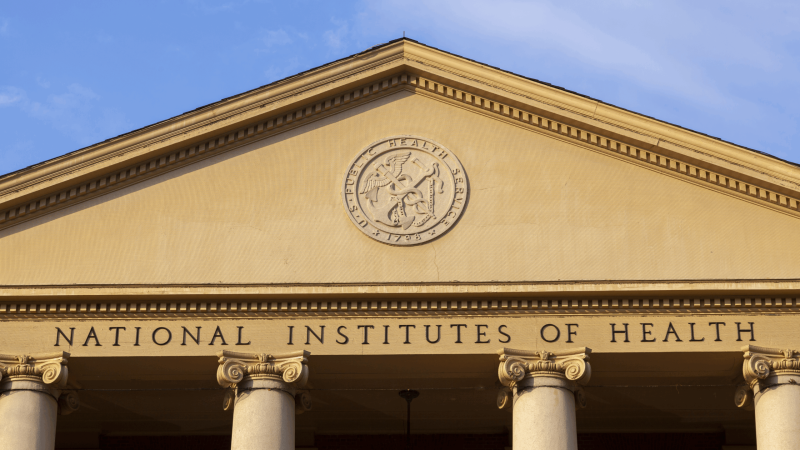Trump's Budget Calls for $17 Billion Cut to NIH, Citing Lax Oversight of Gain-of-Function Research in Wuhan
The White House budget plan says the agency's failure to prove it was not complicit in a possible lab leak shows it's "too big and unfocused."

The White House budget calls for slashing $17 billion in funding for the National Institutes of Health (NIH), citing the agency's failure to properly monitor risky gain-of-function research it funded at the Wuhan Institute of Virology (WIV)—where the COVID-19 pandemic plausibly originated.
"While evidence of the origins of the COVID-19 pandemic leaking from a laboratory is now confirmed by several intelligence agencies, the NIH's inability to prove that its grants to the Wuhan Institute of Virology were not complicit in such a possible leak, or get data and hold recipients of Federal funding accountable is evidence that NIH has grown too big and unfocused," reads the budget summary released on Friday.
Shortly after President Donald Trump's inauguration, the CIA produced a new assessment saying that the agency now favors a lab leak explanation of the pandemic's origins.
The FBI and the Energy Department have also said they favor the lab leak theory, as does Germany's intelligence agency.
NIH has come under intense scrutiny for lax oversight of gain-of-function research it funded at the WIV via its grantee, the nonprofit EcoHealth Alliance.
In the years preceding the pandemic, NIH continued funding EcoHealth's gain-of-function research on coronaviruses, despite White House policies either freezing funding for that type of work or requiring it to undergo more serious scrutiny. It also failed to follow up with EcoHealth when it missed a deadline to submit progress reports on its work at WIV on the eve of the pandemic.
Lab leak proponents point to this work, which involved creating viruses with enhanced potential to infect human cells, as likely seeding the creation of the pandemic at the WIV.
The Biden administration suspended EcoHealth Alliance, and its now-former president Peter Daszak from receiving federal funding in 2024, citing its lax oversight of its subgrantees in Wuhan.
In its last days in office, the Biden administration formally debarred EcoHealth and Daszak from receiving federal funds for the next five years.
Gain-of-function research on pandemic pathogens is a tiny portion of NIH's budget. EcoHealth's grant was just $3 million, and only a portion of that was spent on its controversial work at WIV.
Trump's proposed cuts to NIH are clearly part of a larger agenda to whittle the agency down in size. The budget document also criticizes NIH for funding "radical gender ideology."
White House budget documents are ultimately a political statement, and it's typical that few of the proposed cuts they include are passed by Congress.
It would be notable if Congress declined to take up Trump on his proposed NIH cuts, given the administration's lab leak justification for the cuts.
The final report from the Republican majority on the House subcommittee tasked with investigating the origins of COVID-19 concluded that the pandemic likely resulted from a lab incident.
It would be remarkable if, after coming to that conclusion, House Republicans continued to fund NIH at existing levels without additional oversight of gain-of-function research on pandemic pathogens.
The Trump administration is reportedly going to be issuing a freeze on federal gain-of-function research funding imminently. Sen. Rand Paul (R–Ky.) also has reintroduced a bill to more tightly regulate funding of such research.
Paul's bill passed out of the Senate's Homeland Security and Government Affairs Committee in the last Congress.
